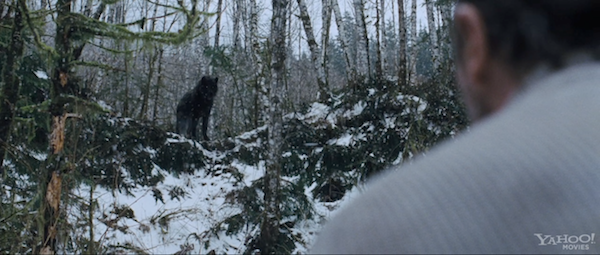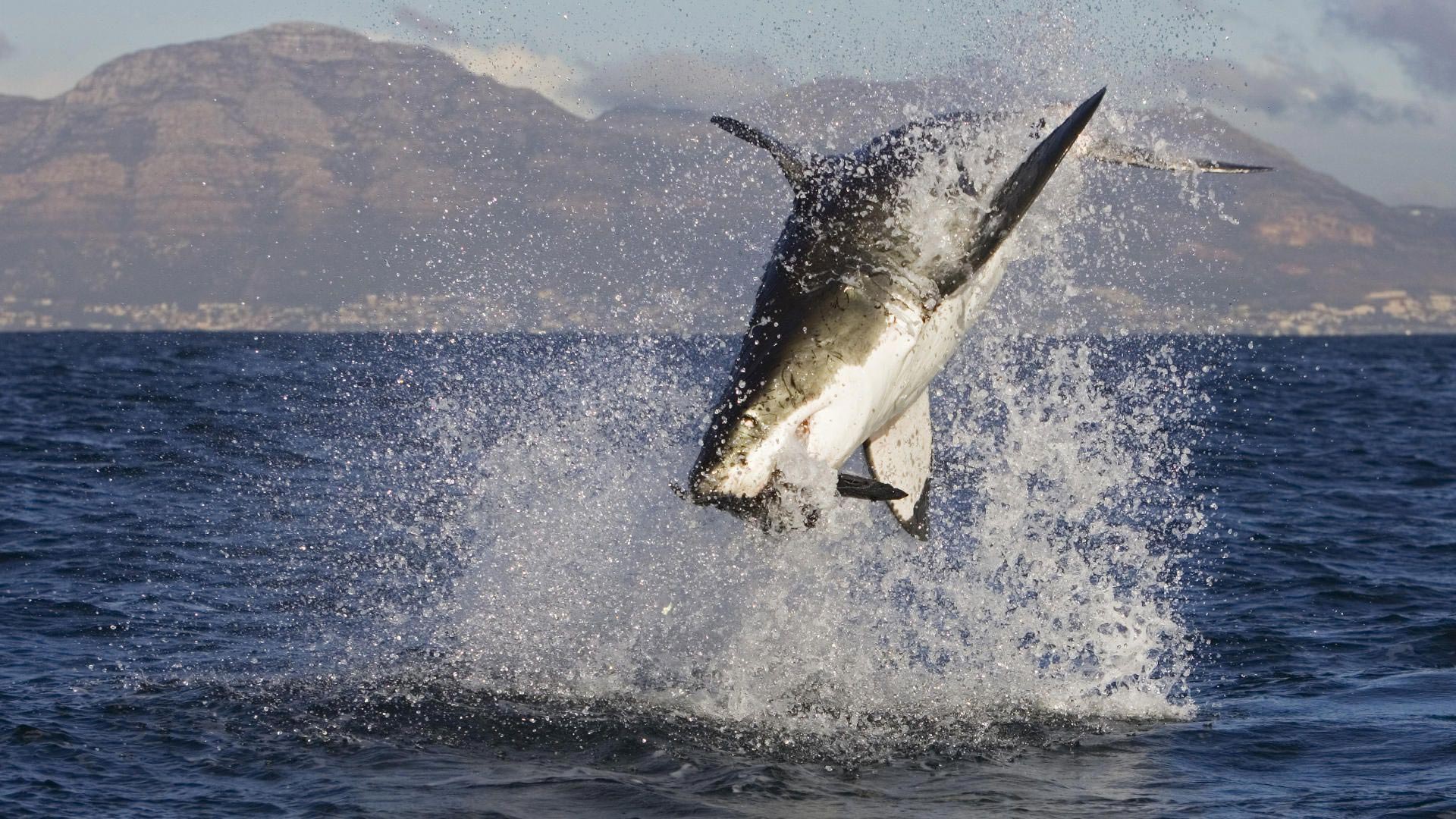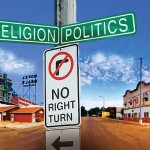Shark Week finished up recently. If you don’t know, Shark Week is a week-long series dedicated to sharks on the Discovery Channel. It’s been running for 26 years, making it the longest running TV event in history. It is very popular. I didn’t watch any of it, but on the last day of Shark Week, I did coincidentally find myself in the Chicago Field Museum with my kids watching a 3D documentary about great white sharks. The film had a conservationist bent, but it still impressed on me how dangerous these animals are. The message of the film was: sharks need not be feared, but they should be respected.
Watching footage of great whites attacking dummy seals reminded me of a passage from Moby Dick in which Melville describes a pod of sharks feasting on the carcass of a sperm whale. He sums up: “If you have never seen that sight, then suspend your decision about the propriety of devil-worship, and the expediency of conciliating the devil.” As a Jungian, I read invocations of the devil like this as references to the dark side of God/dess or Nature. Watching the great whites sharks, the dark side of nature is evident to me; and since nature is my god, I see the dark side of God/dess in sharks.
Darwin has a similar sentiment: “I cannot persuade myself that a beneficent and omnipotent God would have designedly created parasitic wasps with the express intention of their feeding within the living bodies of caterpillars,” he wrote. The key word there is “beneficent”. A god who is wholly beneficent could not have created great white sharks. But God/dess is not wholly beneficent. The lions are not lying down with the lambs. God/dess is also maleficent. Sometimes God/dess wants to kill you. I had a profound sense of this recently while watching the movie, The Impossible, while based on a true story about a family that survives the 2004 Tsunami in Thailand. If the Old Testament is testament to anything it is to God’s dark side, as are a multitude of stories of pagan gods: the climax of Euripides Bacchae is as violent as any shark attack.

Shortly after seeing the shark documentary, I read a post by Joseph Bloch at PaganSquare entitled, “Mine is not a religion of peace.” Bloch is a Heathen (and a Libertarian) and so his is not a religion of pacifism. On the one hand, I have never embraced the Wiccan Rede (“Do what you will, so long as it harms none.”) or the Threefold Law of Return. On the other hand, neither do I share Bloch’s warrior values. I like civilization too much. But I do appreciate Bloch’s challenge to hegemony of harmony in Pagan discourse. There is a lot of talk in Paganism about harmonizing ourselves with nature and its rhythms. But how do we harmonize ourselves with a nature that is both Dea Nutrix (the nourishing goddess) and the “sow that eats her farrow”, both the Good Mother and the Devouring Mother? Is surrender the only path that Paganism offers?
There’s a story that I’ve heard told in Pagan contexts about a deer that lays down its life voluntarily to the hunters. I’ve never hunted a deer, but I’m pretty sure they don’t just lay down for you. Obviously, the story is a myth; but the meaning of the myth bothers me because it denies the reality of the struggle. Deer don’t voluntarily surrender their lives to hunters. Neither do seals surrender to great whites. The law of nature seems to me to be a law of struggle. Nature compels us to fight, even — or maybe especially — when we can’t win. There’s any idea I’ve come across in Heathenry before about fighting against your wyrd or fate. I find this notion appealing. I don’t mean fate in the sense of “destiny” or a denial of free will. I see fate as an acknowledgement of the limits of free will. The most obvious source of fate is Nature, the physical universe, including our bodies and our genes. It seems to me that, if we are to truly honor nature, we must fight against it. I think this is what Melville was getting at when he had Ahab shout to the lighting during a storm:
“I now know thee, thou clear spirit, and I now know that thy right worship is defiance. To neither love nor reverence wilt thou be kind; and e’en for hate thou canst but kill; and all are killed. […] to the last gasp of my earthquake life will dispute unconditional, unintegral mastery in me. In the midst of the personified impersonal, a personality stands here. While I earthly live, the kingly personality lives in me, and feels his royal rights. Though thou launchest navies of full-freighted worlds, there’s that in here that still remains indifferent. Oh, thou clear spirit, of thy fire thou madest me, and like a true child of fire, I breathe it back to thee. […] defyingly I worship thee!”
Indeed, the narrative of Moby Dick can be understood as the story of one man, defiantly throwing himself up against fate (in the form of the whale). Should Ahab be our role model, then? I think Ahab’s path is better than the path of universal harmony advocated by many Pagans. Just because the shark is playing its part in the cycle of life does not mean that I should stop swimming for shore. To much of Pagan talk about God/dess as loving and caring sounds to me like the one-sided (and therefore neurotically repressed) God of Christianity. Of course, we are all part of God/dess. But the same power that runs through each and every cell of our bodies will, in the words of Gilbert Murray, bring us bliss or tear our life to shreds without a break in its own serenity. In my experience God/dess may love you, but She also wants to eat you. And, as Starhawk explains, when God/dess happens then “the rivers of life-force burst the dams and it’s paddle-or-die.”
This reminds me of the movie The Grey, which I’ve written about before here. [Warning: Spoiler Alert!] The movie begins with a professional wolf hunter about to take his own life in despair over the death of his wife, when he is interrupted by the howling of wolves. Later, his plane crashes and the survivors are hunted by a pack of wolves. At the end of the movie, the hunter finds himself in the wolves’ den and he dies fighting the alpha. But in the process, in the struggle to survive, he relearned how to live. The movie ends with these words:
Once more into the fray
Into the last good fight I’ll ever know
Live and die on this day …
Live and die on this day …

I’m not suggesting, like Joseph Bloch, that we treat all strangers as enemies. Nor am I saying that we need to fight each other — though there are times when that is necessary. We have enough things to fight against already to waste energy fighting each other. Life is a struggle for most of us. I think the only harmony or balance to be found is when we have given everything we can, when we have thrown everything we can against the world — only then do we have the right to surrender. We are God/dess’s prey. In the end, we all must surrender to God/dess. But in the meantime, let our worship be defiance. Let us kneel in acknowledgment of all that we cannot change, and then stand in recognition of all that we can. We earn the right to bow our heads to God/dess only after we have fought the good fight with Her. To me, Paganism is not a religion of consolation — it is a religion of action, a religion of struggle, a religion of defiance!
















